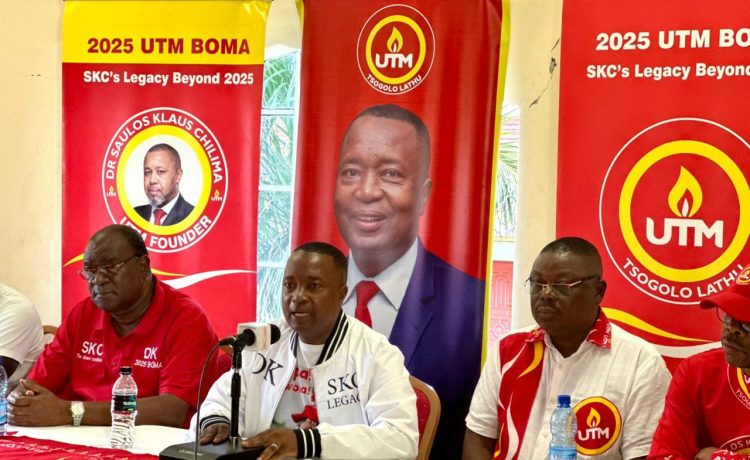By Chikondi Tsongah
In the often tumultuous landscape of Malawian politics, the unflinching memories of past leaders serve as guiding beacons for future generations. However, with the recent launch of the Saulos Klaus Chilima (SKC) Foundation, the Chilima Family boldly expressed their disapproval of the current direction of the United Transformation Movement (UTM), particularly with respect to its leadership under Dr. Dalitso Kabambe.
Mary Chilima’s emotional remarks last night during the launch of the SKC Foundation revealed a rift that threatens to undermine the very essence of the political legacy established by her late husband. As she chastised the current UTM leadership for not aligning with Dr. Chilima’s vision, one must question the integrity of political transitions in the face of tragedy.
Former UTM Director of Women Affairs Mrs. Anne Makuta is on record to have exposed Kabambe ahead of the UTM Convention. Mrs. Makuta disclosed that during the DPP reign when the late Chilima also served as the State Vice President with a strained relationship with the then President Peter Mutharika, Kabambe, the then blue-eyed boy of Mutharika administration, victimized Chilima. Due to the strained relationship with his boss, Chilima became an estranged state Vice President under Mutharika, with funding to his office substantially blocked.
Mrs. Makuta stated that Kabambe, who was Principal Secretary at the Treasury before becoming Governor of the Reserve Bank played a key in victimizing Chilima and his office. She further narrated an incident which she said Kabambe orchestrated when he was Principal Secretary at the Ministry of Foreign Affairs: “There was a time Dr. Chilima was scheduled for an official international travel. Kabambe went to the airport to instruct the airport staff not to roll out the red carpet for Chilima. Can that person claim to love Chilima today?” queried Mrs. Makuta.
The rift between Chilima and Mutharika became unbearably intense such that, while serving as the State Vice President, Chilima orchestrated a breakaway faction from the DPP resulting into his launch of UTM as a parallel political establishment which raced against the DPP in 2019 elections. However, fast forward after the death of Chilima and amidst speculations that Kabambe had been sent by Mutharika to strategically take over UTM and integrate it in the DPP ahead of this year’s general elections, Kabambe successfully manipulated convention delegation to secure a win as the UTM leader, a fate that Chilima’s family bemoaned in their sentiments last night.
The juxtaposition of Kabambe’s leadership against the values exemplified by Saulos Klaus Chilima places a spotlight on a growing concern: Can a leader with such a troubled past genuinely advocate for the legacy of a man he once victimized?
Kabambe’s rapid ascent to power following Dr. Chilima’s untimely death raised eyebrows and ignited debate among party loyalists and the public. Critics allege his motives lean more towards self-promotion than a genuine commitment to uphold the transformative ideals allegedly embodied by the late Chilima. With prior accusations of direct obstruction against Chilima when he served as a high-ranking official under the DPP, Kabambe’s actions echo a troubling narrative of opportunism. Anne Makuta’s revelations paint a picture of a man willing to undermine his predecessor for political gain, raising ethical questions about his current claims of allegiance.
The Chilima family’s forthright admonishment of Kabambe is not simply a personal grievance; it embodies a deep-seated urge to protect the claimed sanctity of Chilima’s legacy. In times of political unrest, leaders often drift from their foundational principles, succumbing to the subtle allure of power. The family’s plea to the public underscored one salient point: the SKC Foundation stands not just as a memorial, but as a movement aiming to transcend the political exploitation of Chilima’s name.
As Mary Chilima implored the public to support the foundation rather than aligning with dubious political figures, it became evident that her advocacy resonates far beyond mere grief. The SKC Foundation seeks to establish the values of integrity, transparency, and genuine service — values that the family claimed that Chilima championed throughout his life. It illustrates a familial commitment to nurturing and cultivating the true essence of what the late Chilima stood for, in stark contrast to a party leadership struggling with accusations of corruption and opportunism.
In the end, the challenge remains: Can UTM reclaim its rightful place as a conduit for the late Chilima’s vision under the leadership of a figure whose past actions have raised substantial doubts? Or will the memory of the late Saulos Klaus Chilima become collateral damage in the festivities of political maneuvering?













